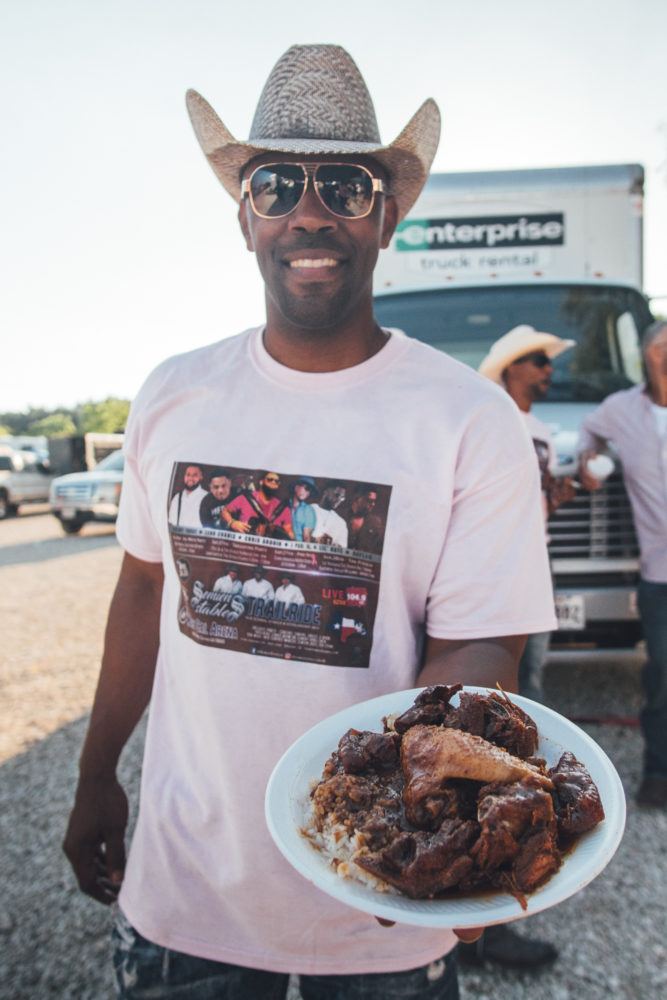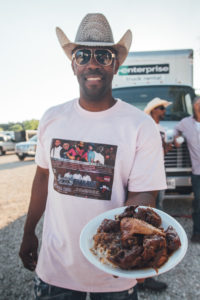Creole Trail Rides
Cattle drivers’ descendants keep their on-the-trail foodways alive
Published: August 30, 2019
Last Updated: December 1, 2019

Photo by Lavonte Lucas
Marcus Semien enjoying a plate.
In her documentary T-Galop: A Louisiana Horse Story, Conni Castille makes the case that the first cowboys were black and from Louisiana. Castille is a professor at the University of Louisiana at Lafayette, and in a March 2016 article published in the Daily Advertiser, she shares research on the role of Creole cowboys who “helped manage thousands of cattle in the pre-Louisiana Purchase days of Southwest Louisiana and led cattle drives to keep New Orleans fed. It was the slave’s job to take care of the mules and the horses because of their value to all parties concerned. And the horses and the mules were better treated than he as the caretaker.”
Hunting, fishing, and living off the land was essential for enslaved people to supplement their meager diets and offered a means for them to earn money, if their owners allowed it. Today, the Creole cuisine that is prepared on trail rides comes out of this tradition of struggle, survival, and freedom. “The trail rides [of my childhood] had some of the best food I had ever tried—food that I normally wouldn’t have eaten,” said Marcus Semien. “We were eating wild game, squirrel, rabbit, and turtle. We just ate it because we knew it was good.”
In Sulphur’s West Cal Arena, the smell of fresh cracklin and sauce piquante was in the air. RVs were scattered throughout the grounds for the three-day weekend. Trail riders gathered outside, barbecuing and stirring pots of simmering stews. Young people wearing cowboy boots and bejeweled jeans danced and sang to the latest zydeco songs until the wee hours. In addition to continuing and enriching a Southwest Louisiana tradition, the Semien Stables Trail Ride serves as the backdrop for many family reunions, and as the 2019 Trail Ride commenced, extended families adorned in matching embroidered shirts mounted their horses with pride.
Darnell Chevalier, a millennial trail rider from Cecilia, Louisiana, explained, “To me, trail rides mean family time. Everybody comes out to support each other’s rides with good times and making food that our grandparents showed us how to cook.” In rural Southwest Louisiana, nothing is wasted. Every part of the hog, hen, rooster, pig, or cow is used to make rich gravies, smoked meat, smoked sausages, boudin, and stews. Chevalier’s pork stew, made with homemade sausages and cuts of pork from a pig he raised, remains true to that tradition, which he promotes on social media, sharing scenes of Creole life in his part of the state.
Shane Boagni from Plaisance, Louisiana, is known as one of the best cooks on the trail ride. He stirred a large cast-iron pot of what he called cowboy stew, or bouye in Creole, made of rooster and hen smothered in a deep brown gravy. “Louisiana, Southwest Louisiana in particular, is the Hot State,” he said. “We are rice and gravy folks.” Like Chevalier, and in contrast to cooks in urban places like New Orleans who depend on chain grocery stores, Boagni noted that he raises his own livestock and grows his own food. As Boagni sees it, Creoles of Southwest Louisiana should be crowned with laurels for their cooking—and more attention should be paid to the culinary diversity of the region.
Zella Palmer, educator, food historian, author, and filmmaker, serves as the Chair and Director of the Dillard University Ray Charles Program in African-American Material Culture. Palmer is committed to preserving the legacy of African American, Native American and Latino culinary history in New Orleans and the South.

